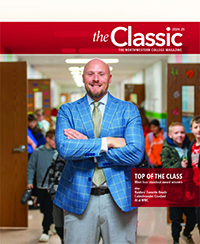NWC team wins local site of programming competition
Tuesday, November 14, 2006
The Northwestern team—John Calsbeek, a freshman computer science major from Orange City; Ben Kester, a junior actuarial science and computer science major from Urbandale; and Mark Larson, a senior math and theatre major from Sioux Center—combined to solve four of the nine problems in the five-hour competition. Out of 181 teams competing at 17 sites in the North Central region, they placed seventh.
The only teams in the region that placed better than Northwestern’s were from three schools: the
“I really can’t say enough good things about the team’s effort,” says Michael Wallinga, instructor in computer science at Northwestern. “All of the judges at our site agreed that the problem set was tough this year. Our opinions were reinforced by the large number of teams that failed to answer a problem correctly, both at our site and across the entire region. At our site, only three teams solved any problems at all. Our entire site solved eight problems correctly, and our team solved four of them!
“Mark, John and Ben did a great job of picking the right problems to do—skipping the most difficult ones and working on the easier problems, although none were easy. They were also efficient and accurate with their submissions. The judges accepted three of their four solutions on the first try, which reduced their penalty minutes and helped them score better than two other teams in the region that had four correct solutions.
“All three students are extremely bright and creative,” says Wallinga. “They know how to attack problems and remain focused in a pressure situation. They also have positive attitudes and humble demeanors. I couldn’t be happier for them; they’re truly deserving of their success.”
Wallinga describes the competition problems as great brain-teasers. He says performing well at the competition requires students to demonstrate creativity, teamwork, the ability to determine which problems are within their capability to solve, and the ability to work under time pressure.
Huddled around a single computer, teams of two or three students collaborate to deduce the requirements, design test beds and build software systems that solve complex, real-life problems under the scrutiny of expert judges. The winning team is the one that solves the most problems in the fewest attempts within the least amount of time.
Over 6,000 college and university teams from 84 countries are participating in the competition, which is in its 31st year and is sponsored by IBM. The top 85 teams will compete in the world finals in

